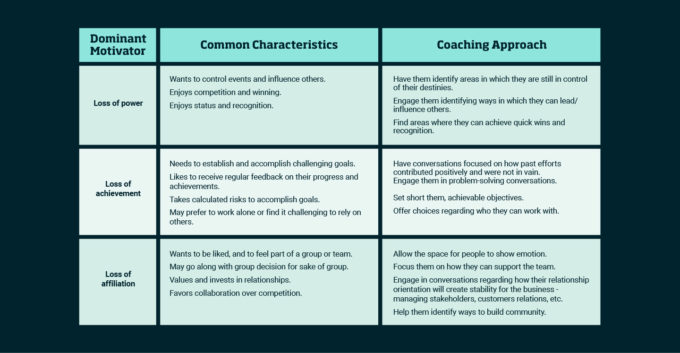
How to manage power dynamics in high-stakes negotiations
Former FBI agent Joe Navarro explains how to leverage non-verbal cues, manage power dynamics, and build trust to overcome deadlocks in negotiations. ...

by Michael D. Watkins, Brenda Steinberg Published 12 October 2021 in Leadership • 7 min read
After more than 18 months of working in a crisis, employees are exhausted, morale is low, and there is no end to the upheaval in sight. With the Delta variant pushing up infection and hospitalization rates and delaying proposed return-to-the-office dates, managers may be struggling with how to keep the motivation and energy their staff from sagging, as they schedule yet another Zoom meeting.
On September 9th, Microsoft postponed its plans to reopen its headquarters, following on from Google, Amazon, Facebook, Ford and Uber that have also extended working from home policies. As people’s bedrooms and living rooms become their offices, the fuzzy line between personal and professional lives may be taking its toll. Other organizations from Goldman Sachs to Johnson & Johnson have mandated vaccines for certain employees. Staff who have grown accustomed to working outside the office may fret that they will be penalized by their employer if they decide they want to permanently work from home.
While it may be tempting to try and move your business on from the pandemic, it is important to remember that everyone’s experience of the COVID crisis has been different, and many will be feeling great uncertainty about their futures. So, even if you experience a strong desire to try to put the pandemic behind you, temper that with a focus on coaching your people to navigate through this new normal. There may be no magic bullets, but there are a few things that can help your staff start to thrive rather than just survive.

Be emotionally available. First and foremost, your people need to know that you understand what they are going through. As the crisis drags on, remember to keep checking in often, monitoring moods, and paying attention to what they are talking about. That way, you will be able to anticipate and directly acknowledge their worries and fears, even if you don’t have all the answers.
Separate fact from fiction. Help your people not get distracted by false information. If a rumor surfaces, ask where it comes from until you know the source. If your people are making unfounded assumptions – optimistic or pessimistic – explore what they are basing their assumptions on and help them see the bigger picture.
Be an optimistic realist. Focus your people on what really is and is not likely to change. Challenge them to find realistic ways of making lemonade out of lemons. But don’t sugar-coat the situation, or people will lose faith in you. Help them see the areas to which they are still able to contribute.
Temper their urge to over-react. Help keep things as stable as possible. Crisis brings out the latent manic-depressive in many people. They are up, they are down, they are all around. It’s your job to stay calm and talk people off the ledge. This applies to you too! Strive the right balance. If you are too emotional, there is no security. If you are too calm, they will think you are not taking the crisis seriously enough.
Figure out what is still worth doing. With the pandemic proving every meeting doesn’t have to be held in person, figure out what aspects of your business’ crisis operations are worth keeping. Regardless of how bad things look, there still have to be battles worth fighting, even if it is just to get a personal sense of closure. So figure out what those must-win battles are and focus your people on them.
Focus on the short term. While many lament that businesses have too much short-term orientation, a crisis is the time when it makes sense to focus on what can be done now. Ask what hat are we going to do in the next week, two weeks, month? Focus on what can be kept and what can be scrapped.
Coaching for motivation
Critically, as you coach, your people stay motivated, focus first on understanding what is demotivating for them, and adjust your approach accordingly. To do this, it helps to have a framework for understanding motivation and the implications for leading during a crisis. The one we have found to be most useful for coaching in crisis situations was developed by the motivational psychologist David McClelland and distinguishes among peoples’ needs for power, achievement, and affiliation, as summarized in the table below.

People are usually motivated by more than one of these, but one is likely to be dominant. So, focus first on understanding what that is, based on what you know and have observed, and then coach accordingly. When leaders coach their direct reports, it is an opportunity for both the leader and the direct report to learn. Coaching is the opposite of knowing; knowing gets in the way of learning. In other words, don’t feel like you need to be the expert before engaging in meaningful conversations.
As you seek to help coach your people to stay motivated, you can find yourself caught in an emotional vise. Even as you try to put on a brave face to deal with distress in your team, you have to cope with the potential impacts on your own life and livelihood. Even you try to set goals and motivate people to attain them, your own morale may be deteriorating.
No one is expecting you to be a professional coach, so don’t overthink it. This is a chance for you to connect with your people. All you need to is be curious, listen, and ask good questions pertaining to what is on the person’s mind. By keeping your focus on the person, you are showing empathy. That doesn’t mean you can’t challenge perspectives by asking if there are other ways to look at the current situation and yet still show you care. You can also add new information and ask how this new information relates to them. People who can find their own solutions, unique to them, are more motivated to act.
In a crisis, your people will appreciate your efforts to have meaningful conversations. That in itself can tap motivation.

Professor of Leadership and Organizational Change at IMD
Michael D Watkins is Professor of Leadership and Organizational Change at IMD, and author of The First 90 Days, Master Your Next Move, Predictable Surprises, and 12 other books on leadership and negotiation. His book, The Six Disciplines of Strategic Thinking, explores how executives can learn to think strategically and lead their organizations into the future. A Thinkers 50-ranked management influencer and recognized expert in his field, his work features in HBR Guides and HBR’s 10 Must Reads on leadership, teams, strategic initiatives, and new managers. Over the past 20 years, he has used his First 90 Days® methodology to help leaders make successful transitions, both in his teaching at IMD, INSEAD, and Harvard Business School, where he gained his PhD in decision sciences, as well as through his private consultancy practice Genesis Advisers. At IMD, he directs the First 90 Days open program for leaders taking on challenging new roles and co-directs the Transition to Business Leadership (TBL) executive program for future enterprise leaders, as well as the Program for Executive Development.

IMD Coach
Brenda Steinberg is an executive coach and leadership consultant with more than 20 years’ experience working with senior leaders. She contributes regularly to executive education programs at IMD and works as a consultant with Genesis Advisers.

6 May 2025 • by Anna Cajot in Leadership
Former FBI agent Joe Navarro explains how to leverage non-verbal cues, manage power dynamics, and build trust to overcome deadlocks in negotiations. ...

5 May 2025 • by Peter J. Meyers in Leadership
The soulless language of management speak leads to uninspired and disengaged teams. Here’s how to sharpen your language skills to become a more effective leader....
 Audio available
Audio available
2 May 2025 • by Sophie Bacq in Leadership
Necessity entrepreneurs demonstrate remarkable resilience and creativity in the face of extreme challenges, offering valuable insights for business leaders seeking to navigate uncertainty in today’s complex global economy. ...

2 May 2025 • by Sunita Sehmi in Leadership
Sarah, a senior manager at a global pharmaceutical company, excels in her role but feels overwhelmed by workplace demands. Struggling to assert herself and make aligned personal decisions, she recognizes the need...
Explore first person business intelligence from top minds curated for a global executive audience